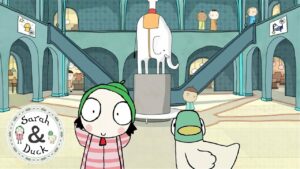What a great way to start the day: with a coffee and a newspaper.
Now, if I was reading The New York Times on March 12th, 1924, then I would see this letter to the editor from Ida Mason.
It begins:
"How many 100% Americans are alive to another sinister and subtle danger that is threatening a vital prop of the nation."
It goes on to say:
"Now I demand a congressional investigation to discover what sinister propaganda is at the bottom of this new peril."
This was written during the Roaring Twenties, at the height of the era of Prohibition.
So, whatever this letter was talking about, it must have been something pretty serious, right?
Well, actually, it was about the disappearance of the subjunctive.
Americans...
Hello and welcome to Canguro English, I'm Christian.
And today, I am going to teach you something completely useless: the subjunctive.
But before we can talk about the subjunctive, we need to understand three very fundamental things about the grammar of English:
Tense, aspect and mood.
The first thing, tense, tells us when an event is happening in time.
Is it the past? Or the present? Or the future?
And we show tense in English by conjugating our verbs.
In this example, "I am a teacher", the verb to be is shown here in the present tense.
So I know that this sentence talks about something in the present.
And, if I want to talk about something in the past, then I conjugate my verb: "I was a teacher."
The next thing, aspect, tells us how we view that event in time.
Are we viewing it as a completed action? Or are we viewing it as something in progress?
Or are we viewing it as something in relation to another event?
Here, I am using the past simple tense, which helps me to view this as a completed action in the past.
Now, if I wanted to view this as something in progress, again, I would conjugate my verb.
Here, I would use an auxiliary verb to be in the past and I would use a verb with the gerund to make the past continuous tense.
The final thing is mood.
Mood indicates modality. It tells us the status of your expression.
Here, in this example, "I am a teacher", I am using the indicative mood, which means that I believe this sentence to be true.
There are other moods in English and we use them in various different ways.
For example, if I want to ask you a question, I can use inversion. I change the order of the words.
"Am I a teacher?"
Now I'm using the interrogative mood.
I could also conjugate the verb and use the imperative mood.
Here, by using the infinitive of the verb to be, I am indicating that this is an order or a request:
"Be a teacher."
Now, wouldn't it be cool if you could indicate that something was not real, such as a wish or a desire, using the same system?
By using moods? By changing the order of words or conjugating a verb?
Well, in a lot of languages, you can and this is called the subjunctive.
Old English had a very complete subjunctive mood.
For example, if this sentence was in old English, then the verb would be this and, if we wanted to use the subjunctive, then we would simply conjugate the verb.
Like this.
And now I know that this is talking about something which is contrary to reality.
So, what happened to the subjunctive mood in modern English?
It's not so much that it disappeared, it's just that we found a different way to express the same thing.
And one of the main ways is this:
Modal verbs.
Modal verbs allowed English speakers to express themselves in exactly the same way as the subjunctive mood.
To talk about probability, possibility, permission, desire.
And people could also use conditional structures if they wanted to talk about irrealis.
And so, over time, the subjunctive mood slowly disappeared.
So, the truth is that, if you know how to use modal verbs and the conditional in English, then you can stop watching this video right now and forget that the subjunctive even exists.
In fact, most native speakers live their whole lives without ever using it.
So, if the subjunctive has basically disappeared from English, then why would you bother to learn what little is left of it?
Two reasons.
The first one is that you need to learn something in order to understand it.
You might not use it yourself, but you might see it in a newspaper, or somebody might use it when they're speaking to you.
And it's really important to understand the structure to understand the person.
And the second reason is flexibility.
Being a good user of a language means that you have various options available to express yourself.
And using the subjunctive is another tool in your toolbox.
So, how can you recognise and use the subjunctive in English?
Well, by far the most common use of the subjunctive is in clauses with "that".
And, in the second part of that clause, we would use the bare infinitive, that is the infinitive form of the verb without "to".
So, it might be helpful for you to think of the subjunctive mood not as a way to conjugate verbs, but as a fixed structure with very specific rules.
And remember that, even though we are using the infinitive of the verb, which maybe to you indicates the present tense,
just remember that the subjunctive mood exists outside of time.
Let me give you some examples.
Here are three example sentences using the subjunctive.
Now, some important things to note.
The first thing is that in this type of clause, using the "that" is optional. You can eliminate it if you want.
The second thing is that regardless of the subject, we use the infinitive form of the verb.
Now, in the first sentence and the third sentence, it's very easy to see the subjunctive being used because normally with "he", we would use "it's".
And here, if we want to negate a verb, normally, we would use "don't" and not "not".
But in the second sentence here, it's completely opaque.
It's impossible to know whether it's using the indicative or the subjunctive mood.
And that's one of the reasons why English developed other ways to express this idea.
But clauses are not the only place that you can find the subjunctive.
The subjunctive can also be used in conditional structures with "if" and also with the verb "wish",
where we would use the so called past subjunctive.
Which raises another question.
Is it correct to say "if I was" or "I wish I was"? Or do we have to say "if I were", "I wish I were"?
The truth is, like all things in English, that you can use whichever one you like, they are both perfectly correct.
And don't let anybody tell you otherwise.
So now it's time for you to practise.
Down in the description box, you will find a fantastic pdf with lots of examples and activities.
And, of course, it's completely free.
Well, I hope you found this class interesting.
This class was made possible by all of my incredible patrons on Patreon.
Thank you very much.
If you would like to sponsor free English education, then check out the link in the description box below.
And if you would like to see any more videos about the English language, then don't forget to subscribe.
I am Christian, this is Canguro English. I'll see you in class.






